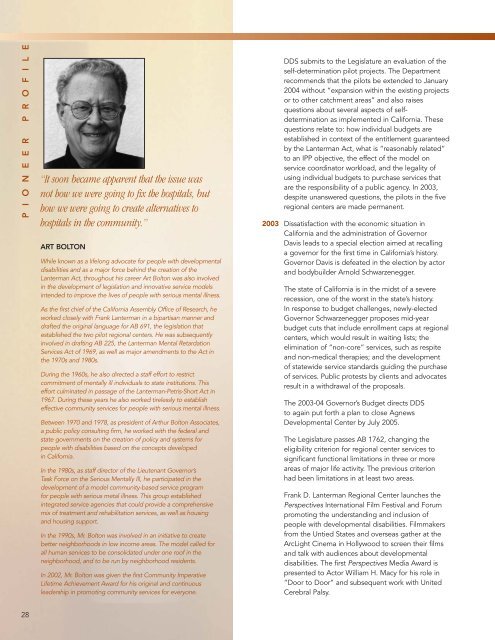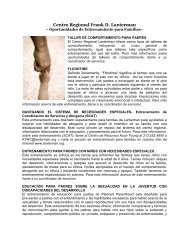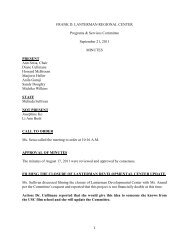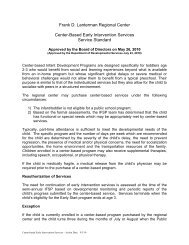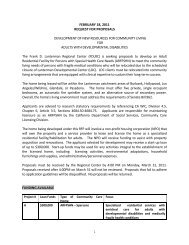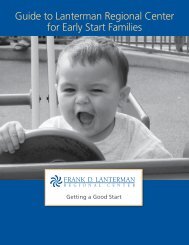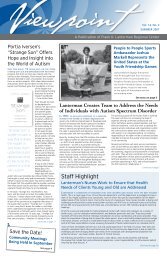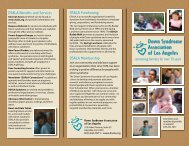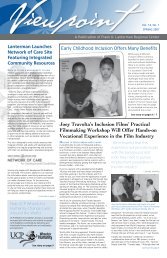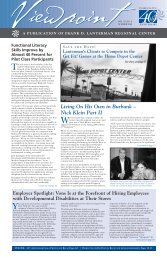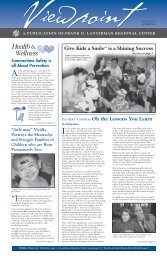40th History Brochure-r2 - Frank D. Lanterman Regional Center
40th History Brochure-r2 - Frank D. Lanterman Regional Center
40th History Brochure-r2 - Frank D. Lanterman Regional Center
Create successful ePaper yourself
Turn your PDF publications into a flip-book with our unique Google optimized e-Paper software.
P I O N E E R P R O F I L E“It soon became apparent that the issue wasnot how we were going to fix the hospitals, buthow we were going to create alternatives tohospitals in the community.”ART BOLTONWhile known as a lifelong advocate for people with developmentaldisabilities and as a major force behind the creation of the<strong>Lanterman</strong> Act, throughout his career Art Bolton was also involvedin the development of legislation and innovative service modelsintended to improve the lives of people with serious mental illness.As the first chief of the California Assembly Office of Research, heworked closely with <strong>Frank</strong> <strong>Lanterman</strong> in a bipartisan manner anddrafted the original language for AB 691, the legislation thatestablished the two pilot regional centers. He was subsequentlyinvolved in drafting AB 225, the <strong>Lanterman</strong> Mental RetardationServices Act of 1969, as well as major amendments to the Act inthe 1970s and 1980s.During the 1960s, he also directed a staff effort to restrictcommitment of mentally ill individuals to state institutions. Thiseffort culminated in passage of the <strong>Lanterman</strong>-Petris-Short Act in1967. During these years he also worked tirelessly to establisheffective community services for people with serious mental illness.Between 1970 and 1978, as president of Arthur Bolton Associates,a public policy consulting firm, he worked with the federal andstate governments on the creation of policy and systems forpeople with disabilities based on the concepts developedin California.In the 1980s, as staff director of the Lieutenant Governor’sTask Force on the Serious Mentally Ill, he participated in thedevelopment of a model community-based service programfor people with serious metal illness. This group establishedintegrated service agencies that could provide a comprehensivemix of treatment and rehabilitation services, as well as housingand housing support.In the 1990s, Mr. Bolton was involved in an initiative to createbetter neighborhoods in low income areas. The model called forall human services to be consolidated under one roof in theneighborhood, and to be run by neighborhood residents.In 2002, Mr. Bolton was given the first Community ImperativeLifetime Achievement Award for his original and continuousleadership in promoting community services for everyone.DDS submits to the Legislature an evaluation of theself-determination pilot projects. The Departmentrecommends that the pilots be extended to January2004 without “expansion within the existing projectsor to other catchment areas” and also raisesquestions about several aspects of selfdeterminationas implemented in California. Thesequestions relate to: how individual budgets areestablished in context of the entitlement guaranteedby the <strong>Lanterman</strong> Act, what is “reasonably related”to an IPP objective, the effect of the model onservice coordinator workload, and the legality ofusing individual budgets to purchase services thatare the responsibility of a public agency. In 2003,despite unanswered questions, the pilots in the fiveregional centers are made permanent.2003 Dissatisfaction with the economic situation inCalifornia and the administration of GovernorDavis leads to a special election aimed at recallinga governor for the first time in California’s history.Governor Davis is defeated in the election by actorand bodybuilder Arnold Schwarzenegger.The state of California is in the midst of a severerecession, one of the worst in the state’s history.In response to budget challenges, newly-electedGovernor Schwarzenegger proposes mid-yearbudget cuts that include enrollment caps at regionalcenters, which would result in waiting lists; theelimination of “non-core” services, such as respiteand non-medical therapies; and the developmentof statewide service standards guiding the purchaseof services. Public protests by clients and advocatesresult in a withdrawal of the proposals.The 2003-04 Governor’s Budget directs DDSto again put forth a plan to close AgnewsDevelopmental <strong>Center</strong> by July 2005.The Legislature passes AB 1762, changing theeligibility criterion for regional center services tosignificant functional limitations in three or moreareas of major life activity. The previous criterionhad been limitations in at least two areas.<strong>Frank</strong> D. <strong>Lanterman</strong> <strong>Regional</strong> <strong>Center</strong> launches thePerspectives International Film Festival and Forumpromoting the understanding and inclusion ofpeople with developmental disabilities. Filmmakersfrom the Untied States and overseas gather at theArcLight Cinema in Hollywood to screen their filmsand talk with audiences about developmentaldisabilities. The first Perspectives Media Award ispresented to Actor William H. Macy for his role in“Door to Door” and subsequent work with UnitedCerebral Palsy.28


